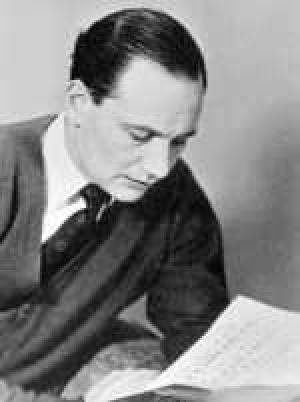LEGENDS OF
LIGHT MUSIC
Lou Whiteson

LOU WHITESON
Tony Clayden Salutes a Familiar
Name from BBC Radio
Those who were
regular listeners to BBC during
the late ‘40s, ‘50s,
‘60s and into the ‘80s
will surely remember the name of
Lou Whiteson.
Although always
known as Lou (sic), the given
name on his birth certificate was
Lewis Solly. He was born in 1912;
the family lived originally at 19
Wentworth Street, Spitalfields,
in the heart of London’s
Jewish East End. His father was
Nathan Weitzen, a tailor who had
been born in Galicia (which was a
territory east of Austria that
straddled the present border
between Poland and Ukraine). The
family moved to the North London
suburb of Stoke Newington, where
Lou started school and began
fiddle lessons there at the age
of 9; he showed considerable
promise and was latterly taught
by Henry Kenning.
He left school at
around the age of 14 and started
playing in cinemas (unpaid) for
experience. After a year or two,
he unsuccessfully tried for a
musical scholarship in Russia.
The Musicians’ Union stopped
the free playing and he began to
work regularly in various cinemas
in North and East London and also
at the Commodore, Hammersmith,
where he played under Joseph
Muskant.
Once talking
pictures came in, Lou, together
no doubt with many of his
colleagues, suddenly found
himself out of a job, and for a
while sold light bulbs in the
street. He was then told of a job
in Kenya playing in a hotel,
which he did for about four
years; this was followed by a
further two years in
Johannesburg, during which time
he had more lessons. He came back
to the UK in 1936 and played in
hotel orchestras at Manchester,
Gleneagles and others. During his
time in Manchester, Fritz
Kreisler heard him and told Lou
how much he enjoyed his playing.
The outbreak of
war saw him joining the Royal Air
Force and it was originally
intended that he would become an
aircraft gunner. However, because
he suffered from migraine, he was
re- deployed within the
RAF’s music organisation,
where he booked musicians and
played with various RAF house
orchestras. After the war he
auditioned for the BBC Welsh
Orchestra, and I believe he was
offered a post, which he did not
however take up.
In 1948 Lou was to
be found in the London Palladium
Pit Orchestra accompanying the
famous show by Vivian Ellis,
Bless The Bride and by the late
‘40s and early ‘50s he
was leading for Sidney
Torch’s Metropolitan
Orchestra. In 1948 he had joined
the music staff of the BBC; this
was at a time when, due to union
regulations, the BBC was obliged
to employ a number of orchestras
and these contributed a great
deal to the programme schedules.
There was established what became
known in the BBC as ‘The
Unit’; this was a group of
musicians who would perform under
a number of different names, eg
The Southern Serenade Orchestra
and The Majestic Orchestra, both
of which he would conduct, taking
over from Reginald Leopold who
left the BBC for a while. Other
names which he would play for,
but not necessarily conduct,
included The London Studio
Strings and The London Studio
Players, and sometimes he would
direct his own Whiteson
Orchestra, all of these being, as
described above, made up of the
same body of musicians.
Over the years, he
appeared in a multitude of
different programmes –
Continental Serenade, Rainbow
Room, Music At Teatime, Morning
Music etc. He regularly played
with musicians such as Billy
Mayerl, Edward Rubach and Robert
Docker, and also Clive Richardson
and Tony Lowry. Some of
theContinental Serenade
programmes with the Majestic
Orchestra were broadcast in what
was known as the General Overseas
Service of the BBC (which later
became the BBC World Service).
1952 saw the
beginning of his interest in
Latin American music, for which,
like his colleague Stanley Black,
he became famous. Other
programmes in which he appeared
either as player or conductor
included Cavalcade Of Light
Music, Saturday Serenade, Music
All The Way , Music Mixture where
he worked with Gilbert Vinter,
Serenade In The Night, Midday
Melody Hour, Melody Time, Melody
Showcase, Time For Music, Music
Of The Sunny South, Music For The
Housewife, Fiesta and Lights On.
Lou Whiteson
recorded a number of programmes
for Rediffusion (probably for
their overseas operation) and
appeared on several LPs for that
company’s record label. His
last ‘gig ‘was in 1983
forMusic While You Work, but he
was brought out of retirement
again in the early ‘90s for
a further reprise of the series.
He was also a
teacher; he regularly gave
lessons at Worth Abbey School in
Crawley, Sussex, and in addition
taught privately . As can be seen
from the above, he had a very
long and varied career, and was a
mainstay of the BBC Home Service
and Light Programme, and latterly
Radio 2, for very many years. He
died in November 1997.
I must express my
gratitude to Madeleine Whiteson,
(whom he met when she joined
‘The Unit’!) for kindly
making available such a wealth of
information about her late
husband.
This article first
appeared in Journal Into Melody,
issue 194 December 2012
|